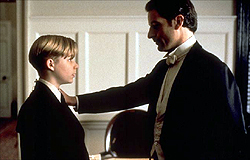












 |
The Winslow Boy, his elegant adaptation of Terence Rattigan's 1946 play, is no exception. Set in 1912 and based on a true story, it hinges on the Admiralty's "sacking"of naval cadet Ronnie Winslow (winningly played by 13-year-old Guy Edwards) for allegedly stealing a five-shilling postal note. He insists to his father, Arthur (the magnificently subtle Nigel Hawthorne), that he is innocent, and Arthur dedicates himself to proving this, unwittingly turning the case into a national cause c�l�bre.
If the ensuing, superbly rich study of justice, Englishness, and ends-and-means is Rattigan's, the playwright's dialogue has acquired an unmistakably Mametian hue: words and phrases are repeated over again for rhythm and emphasis; apparently unrelated sentences melt into each other as if a full-stop had fallen off the page. (Thoughts on marriage elide into a question about trees, a court-martial into curtains, a trial into onions.) It is contrived, certainly, but there is much wit, and the dialogue's fractured fluency proves oddly seductive.
Mamet's visual style is far less fussy. He has preserved the uncluttered, apparently sepia-and-gold-tinged look of The Spanish Prisoner, which complements the period and gives the characters room to breathe in the generally small sets. He has also opted not to keep to Rattigan's unity of place, a move that helps stave off the sensation of watching a filmed play.
The first two-thirds of the film belong to Hawthorne - superb as the mischievous and authoritative paterfamilas driven to nagging self-doubt - but he is not allowed to keep the baton indefinitely. In a shift of emphasis that is slightly disconcerting, the rest is dominated by Jeremy Northam's attorney and his journey from braying arrogance to tearful compassion. Northam does not have long to make this transition, but he does so with bravura.
Mamet's wife Rebecca Pidgeon is less successful as Arthur's suffragette daughter, Catherine. While her sinister strangeness suited The Spanish Prisoner perfectly, it is disconcerting here. She delivers her lines like an alien doing a good but imperfect impression of a human being, and never quite convinces - my only serious compaint about an otherwise hugely poised movie.
The latest offering from Mike Newell, director of Four Weddings and a Funeral, is a rather more flaccid affair, a comedy-drama set in the high-stress, testosterone-fuelled world of air traffic control.
Pushing Tin starsJohn Cusack as Nick Falzone, fast-talking king-of-the-scope at New York's TRACON (Terminal Radar Appraoch Control). He can land planes ("push tin") with his eyes closed, has a beautiful wife (Cate Blanchett) and is generally the guy to know.
That is until the arrival of Billy Bob Thornton's taciturn, stubbly wild-man. A serious professional threat, he also has a blatantly desirable spouse (Angelina Jolie). Nick first encounters her at a barbecue, her ample bosom locked in mortal combat with a skimpy leopard-skin top. She clearly has a drink problem, but he is hooked anyway, and it is not long before he strays - with disastrous consequences.
Pushing Tin's chief virtue is the quality of its performances. Cusack's perculiarly innocent cockiness is perfect for his role as a falling star, and the sparring between him and the contrastingly reticent Thornton is often entertaining.
Blanchett, meanwhile, has traded the robes of state and regal bearing from Elizabeth for chenille sweater and endearing nervousness, and is a persuasive, often amusing model of marital frustration.
Nor has Newell forgotten how to choreograph moments of high comedy - but there are not enough of them. More damagingly, he seems uncertain as to what Pushing Tin is supposed to be. There is nothing wrong with combining genres within a single film, but they need to be properly fused, not heaped on top of one another. Here, the film seems to lurch between, comedy, drama, the buddy-buddy histrionics of Die Hard 2, and Top Gun schmaltz without any real sense of purpose.
Worth seeing for the lead performances, but none the less disappointing.
